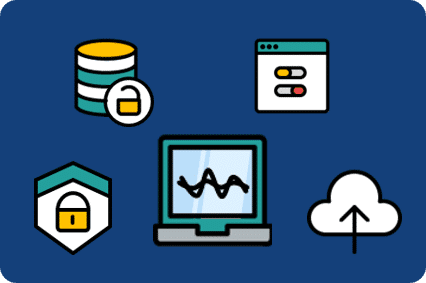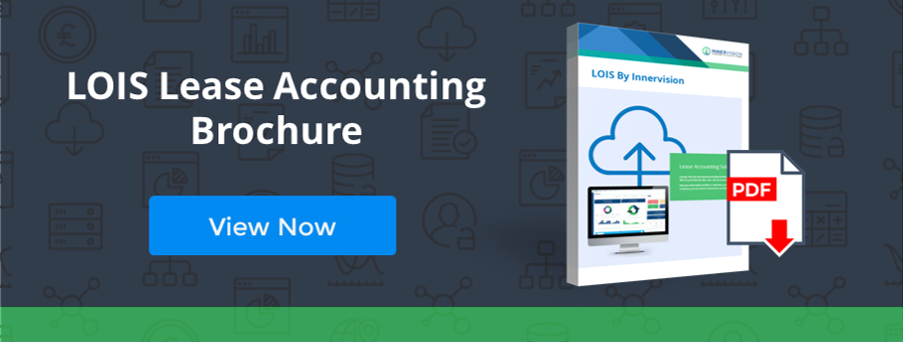The 10 Best LOIS Lease Accounting Software Features Users Depend On
Updated 26th May 2021 | 7 min read Published 13th February 2018

The introduction of the new lease accounting standards, IFRS 16 and FASB ASC 842, will have a significant impact on the way leases are recognised on financial statements.
The new standards require lessees to account for the majority of leases "on balance sheet", and lessees have to recognise all right-of-use assets and associated lease liabilities arising from their lease agreements.
Implementing these new accounting practices is no small feat. But there is some good news: a handful of premium-quality lease accounting software solutions, which greatly simplify this undertaking, are now available.
That said, not all of these software solutions are created equal. And, with the 1st January 2019 compliance date drawing closer, companies cannot afford to waste time on software that is not 100% fit for purpose.
Must-have accounting software features:
Do you know which lease accounting software features you should look for if your organisation has not implemented a system yet? Here we identify the 10 most important features users depend on - all of which feature as components of Innervision's lease accounting solution LOIS.
1. A Centralised Data Repository
In the move to comply with the new standards, organisations must build a comprehensive lease portfolio by centralising all leas data in a single repository, writes Director of Finance Solutions and Mobility at SAP, Pete Graham, in an article published by Digitalist Magazine.
However, collecting data and implementing systems that allow for data centralisation are among the biggest headaches companies currently face. According to PwC's 2017 Lease Accounting Survey, most organisations (70%) are still manually extracting data from their leases.
Innervision's lease accounting solution is perfectly geared towards storing and centralising both lease data and any supporting documentation for efficient management, filtering and reporting. Companies who have adopted the system find that it is simple to transfer lease data onto LOIS and that it is easy to manage data and contracts centrally through the sophisticated though intuitive software system.
2. Possibilities For Team Collaboration
In addition, Graham notes that the right technology should offer your entire organisation (not just a single user) the ability to track changes and understand who made them.
Have you found a way to make it easy for your team to collaborate and see who made changes where? If not, LOIS might be the solution for you. The software is designed for use by all employees involved in leasing, and the actions they take are easy to track.
With LOIS, a cloud-based system, your company can also create multiple user accounts with customised access levels, so that individual team members can work with the real-time data they need from anywhere in the world. As long as they’re online, and registered on the system, they can sign in, access and use the data.
3. A Tool That's Specifically Designed For Lease Accounting
Many companies still use Excel to track leases. But this software simply is not designed for the purpose of lease accounting and adds needless challenges, especially in the context of IFRS 16 and FASB ASC 842 compliance.
“Under new guidance, leased assets may need to be accounted for like other fixed assets; there needs to be effective controls over initial measurement, subsequent changes, and impairment,” reads an article in the Journal of Accountancy.
Whereas Excel spreadsheets may have been sufficient in the past, they will not suffice in future. For example, Excel cannot alert employees of deadlines for lease renewals or easily and accurately reflect in-life changes. The software also does not recognise data entry errors or offer instant reports to give employees insights into leasing activities.
A software system like LOIS, on the other hand, offers integrated functionality that is specifically geared towards lease accounting.
4. Compliance With IFRS 16 and FASB ASC 842 Standards
Failure to comply with the new lease accounting standards could have important consequences for companies, as future business partners might very well base their assessments on balance sheet financials. Using a system that does not comply with IFRS 16 and FASB ASC 842 could make it very hard for your company to do business in years to come.
LOIS is one example of a piece of lease accounting and management software that will help you to see your portfolio instantly, find out if you are compliant with the new standards, and help you to instantly access the effects on your balance sheets as and when required.
The system stores all required data and will allow you to pull comparative figures from before and after the implementation of the new standards. The software also allows you to lock down your financial data, preserving its integrity.
5. Powerful Reporting Features
With both the current and new lease accounting standards, companies are required to run regular lease accounting reports. Finding an easy way of generating these reports can save your organisation time and money.
With LOIS’s system, you are not only able to quickly pull integrated reports, you are also able to easily produce a before-and-after analysis of the standards’ effects. This analysis is a valuable resource for educating departments, employees, key stakeholders and investors. It will also allow you to trial the transitional accounting options available and to choose the most financially advantageous.
If you implement LOIS, your company can also run detailed financial reports that show information at an asset-specific level, and which include data such as serial numbers, locations and model numbers.
6. The Ability To Easily Identify Leases And Optimise For End Of Lease
As a result of competing priorities and poor record keeping, many companies let leases roll over once the minimum term is up. This can needlessly cut into profit margins.
With LOIS, users get early-warning notifications plus advice to help you understand the implications of ending or extending your lease agreements. The automated messages give you the flexibility to optimise your lease portfolio while driving cost savings and an improved return on investment.
7. Good Value For Money
In tough economic times, businesses are looking for ways to cut costs across the board.
With LOIS as the hub of leasing in your organisation, processes can be 100% automated while data can be made instantly available. This makes lease-related tasks faster, which ultimately frees up resources.
The software also quickly identifies where you overspend and where out-of-date agreements are still in place. These are valuable tools that can make your company more profitable and with the refresh of assets more competitive.
8. Advanced Business Intelligence
If you’re determined to run a profitable business in years to come, it is important to use software that can provide rich analytics and visibility into your portfolio composition. The software should also provide “what-if” scenario analyses to help you identify opportunities and threats, according to Graham.
Once again, LOIS offers a smart solution: the software incorporates advanced business-intelligence dashboards as well as visualisation tools that provide instant access to your portfolio’s performance. You can use this information to gain actionable insights into the overall health of your business.
9. A User-Friendly Interface
With the January 2019 compliance deadline looming, accounting teams need to hit the ground running when new lease accounting software is implemented. “It is very important to look for a solution that allows for efficient management of lease administration for equipment in a user-friendly, visual format that is easy to learn and use,” Graham notes.
With LOIS, your team will be able to instantly find what they need. The dashboard is easy to use and, thanks to an intuitive interface, minimum training is required. Plus, Innervision is just a phone call away if you need assistance.
10. Appropriate Security Measures
Across the globe, security remains a concern for companies that employ lease accounting software. With LOIS, you can rest assured that your company information is protected by strong SSL encryption, which scrambles the lease accounting data, making it virtually impossible for unauthorised people to access it.
The software also makes regular backups of the leasing data to ensure that it stays safe, while all data is held on servers located in secure data centres. These servers are protected by strong firewalls, kept in purpose-built premises and served by redundant power supplies and internet connectivity.
If these features are something you’d like to explore further, take a look at our LOIS Lease Accounting brochure.


